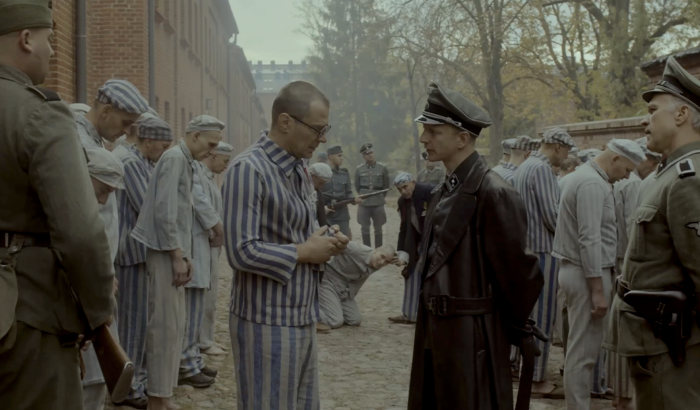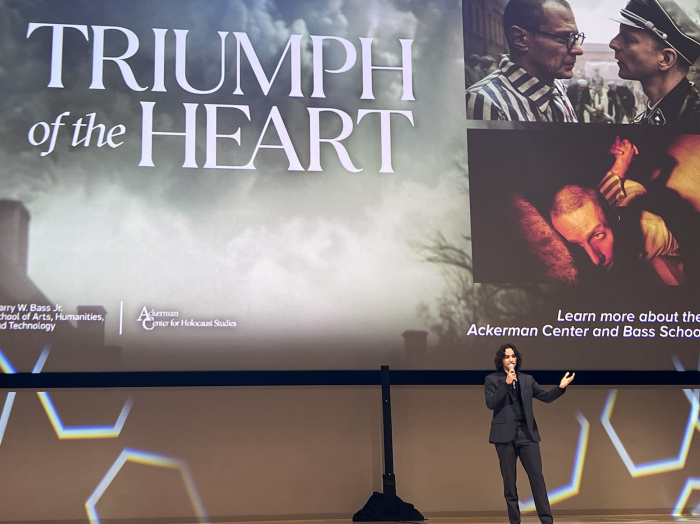
RICHARDSON, Texas — The cast behind “Triumph of the Heart,” a new feature film dramatizing the life and sacrifice of St. Maximilian Kolbe, reflected on why they believe the story of the Catholic martyr, eight decades after his death, is urgently needed at a time of cultural confusion and despair.
The film, hitting theaters on Sept. 12, portrays the Franciscan friar who offered his life in place of another man at Auschwitz in 1941. Eighty years later, his testimony of sacrificial love continues to resonate with audiences searching for hope.
Written and directed by Anthony D’Ambrosio, “Triumph of the Heart” was filmed on location in Europe and the U.S., with much of the production built around recreating the grim barracks of Auschwitz and the claustrophobic starvation cell where Kolbe and nine other men were held for nearly two weeks.
Though the story focuses largely on Kolbe’s decision to take another man’s place, it shows flashbacks of his earlier work in Poland, where he ran a monastery that became a center of Catholic publishing. Through underground presses and radio broadcasts, Kolbe championed truth and faith against the tide of Nazi propaganda.
At the red carpet premiere of the film, held at the University of Texas at Dallas on Sept. 8, Rowan Polonski, who stars as Albert, one of the men in the starvation bunker alongside Kolbe, said the process of bringing the men’s final days to life was both physically and spiritually demanding.
“I think it’s going to be an experience that’s very hard to match,” he said. “We were all in it together — fasting, training, even losing weight to better understand the toll. It stripped everything away and left me with a clearer picture of who I am when everything else falls apart. That’s stayed with me since.”
Polonski said he hopes audiences walk away not looking outward for blame but inward for meaning. “Ultimately, that’s where relationships with God are formed. When people ask themselves the essential questions — who they are, where the love in their life comes from — that’s where they’ll find answers.”
The events of “Triumph of the Heart” are largely fictionalized; little is known about what actually happened in the days after Kolbe and the others were locked in the starvation bunker. Just one witness, one of the camp’s janitors, reportedly heard Kolbe leading the prisoners in prayer and singing, according to his official biography.
Polonski told CP the film distills Kolbe’s legacy into a simple message. “We live in a world bombarded with information — AI, headlines, opinions. This movie reduces everything down to a beautiful message: love is the thing to follow; love is the thing to guide us. It’s easy to forget that today.”
“It’s about hope,” he said. “And about reminding us that, even in the darkest places, love endures.”
Christopher Sherwood, who plays Karl Fritzsch, the real-life Nazi officer who served as a commandant at the Auschwitz concentration camp and later died in disgrace, recalled the shoot as a wrenching experience that often blurred the line between performance and reality.
“When I wrapped my last scene, I was asked to give a speech, and I got about five words in before I just burst into tears,” he said. “I lived alone, ate alone, stayed apart. It was miserable, but it gave me insight into my character’s isolation. At the same time, the humanity and community I saw on set was deeply inspiring. Even in darkness, love emerges.”
Though the film includes scenes that are difficult to watch as the men face starvation and grapple with the reality of their looming deaths, Sherwood stressed it doesn’t depict “torture for torture’s sake.”
“It’s about people coming together in the name of love. That’s what moved me most,” he said.
Actress Sharon Oliphant, who portrays Francisca, Fritzsch’s calculated wife, noted that she tried to inhabit the role without judging her character as a villain. “I was coming into an unknown scenario, a foreign country, a man I’d never met,” she said. “That turmoil, that isolation, was real for me. And yet what the film shows is that even amid chaos, love and community are what endure.”
She added that Kolbe’s sacrifice speaks to a generation searching for identity and connection. “A lot of young people feel isolated and alone,” she said. “But when we seek to love and serve others, when we live selflessly in community, it changes everything. That’s the kind of love Kolbe embodied — the kind worth remembering.”

The film was introduced by Michael Iskander, the “House of David” star who converted to Catholicism last month. Speaking to hundreds gathered in the theater, he framed Kolbe as a man who understood the power of media and faith in shaping culture.
“He knew the power of film and technology to spread truth,” Iskander told the audience. “When the Gestapo arrested him and deported him to Auschwitz, it was there he made that decision — to lay down his life for another man he didn’t know.
“This film is a special film,” Iskander added. “This film is not just about everything before. It’s about that decision that he made and how he ministered and shepherded everyone in that cell.”
“Triumph of the Heart” hits theaters on Sept. 12.
Leah M. Klett is a reporter for The Christian Post. She can be reached at: leah.klett@christianpost.com

















